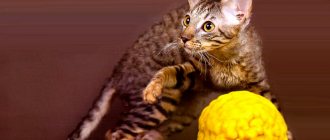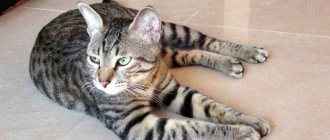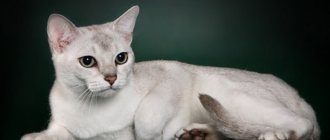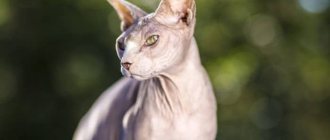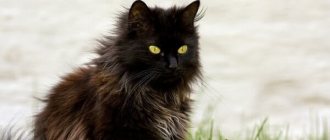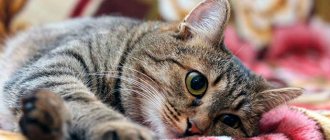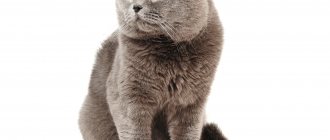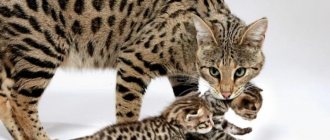History of the breed
German Rex (German Rex, Prussian Rex) were born in Germany. This happened naturally. In East Prussia, located near Königsberg (modern Kaliningrad), in the 30s of the 20th century, an ordinary cat brought a litter from a Russian Blue cat (according to another version, the cat was of the Russian Blue breed, and the origin of the father is unknown). One kitten from the litter, named Munch, was different from the others: he had curly hair, a lively mind and an active, friendly character, which allowed him to become the father of numerous kittens born in this village. Some of the cubs were born with curly hair, and the village residents gladly kept them as pets, since Munch’s descendants had not only an unusual appearance, but also an affectionate and devoted character. Curly-haired cats became the highlight of Königsberg; they were even given to guests of the city. Thus, the rexes spread throughout Germany.
German Rexes are similar to ordinary cats, but have a beautiful and pleasant wavy coat.
After World War II, during the occupation of Germany, residents left the country en masse and took curly-haired pets with them, helping them spread throughout the world. In 1951, one of the cats with wavy fur ended up with a lover of these animals with medical education, Rosa Karpin. Rose named her Lamb (Lamchen) and tried to find out the reasons for the appearance of curls, as well as to develop and legitimize a new breed. It is this cat that is considered the official ancestor of the German Rex. Most likely, she was the granddaughter or great-granddaughter of Munch from East Prussia.
Lamchen brought curly-haired kittens, German breeders began to take them to nurseries, and the new breed attracted everyone's attention. As for the reason for the appearance of wavy hair in cats, it was recognized as a gene mutation that occurred naturally.
In 1968, the German nursery Vom Jura Grund began professional work on this breed, crossing curly-haired cats with the European shorthair breed. Animals bred in this nursery were considered very rare and were almost never sold to other countries.
This is what the Lamchen cat looked like, which is the official ancestor of the German Rex breed in Germany
At the same time, several German Rexes were exported to America. The Americans, in turn, involved other breeds in breeding work - Cornish Rex and American Shorthair cats. As a result, already in 1970, a breed standard was adopted and registration was made with the felinological organizations FIFe and WCF. Almost all cat clubs have recognized the German Rex as a separate breed.
Now German Rexes are widespread throughout the world and can be seen at most international cat shows. However, in Russia it is not easy to buy such an animal, since there are no clubs or nurseries for the German Rex breed. In our country, other varieties of Rex, such as Cornish and Devon, are more popular.
Offspring
From two to seven individuals appear in a litter. They quickly adapt to the world around them. On the eighth day of life they open their eyes, and in the second week they begin to hear.
Recommended reading:
Khao Mani cat breed: origin, breed characteristics and care
During the first weeks you should pay close attention, as children are not at all independent. It is important to keep your ears and eyes clean at all times. From birth, you need to be taught to trim your nails. Do this carefully, do not scare your pet, wait until he relaxes. Complementary feeding can be started from the sixth week; this can be milk porridge and cottage cheese, as well as dietary meat.
Adorable curly-haired babies become pets from the first minutes. They are cheerful, mischievous, smart. They learn quickly and get used to the tray. Thanks to their curiosity, kittens can explore the hidden corners of their place of residence day and night. They will play and be mischievous all day long. Therefore, from the first days of life, buy toys for them. You will never be bored with them!
Herman Rex in the photo
Description of German Rex
German Rexes are medium in size and have a build similar to the European Shorthair, which is listed among their ancestors. Males weigh 4–4.5 kg, females - about 3 kg. The main feature of the breed that distinguishes them from other varieties of Rex is a special curl of elastic, silky hair, uniform and clearly visible throughout the body.
It is for their curls that Prussian rexes receive affectionate nicknames from their owners: “lamb”, “bear cub”, “curly” and the like.
Appearance
The body of the German Rex is muscular, of medium size, with a strong chest of a slightly rounded shape. The back has a straight line from the shoulders to the croup, the legs are of medium height, slender, with oval-shaped paws. The tail is not very long, strong and mobile, rounded at the end and well feathered.
The head is rounded, with high cheekbones, the ears are quite large, wide at the base, rounded at the ends, set high, with a significant distance between them, well furred on the outside and not very mobile. The eyes are medium in size, widely spaced, pure color, in harmony with the color of the coat. The chin is well defined, the nose is long, slightly curved at the base, the mustache is short, slightly curled.
German Rexes can have any eye color, but yellow, amber or blue are more common.
Any colors are allowed. The coat itself is short, soft and silky to the touch, similar to plush, without guard hairs. The density of the coat can be different: there are cats with both a uniform and thick coat, and those with a thin and soft coat. The main criteria for wool quality are the uniformity and pronounced structure of curls throughout the animal’s skin. When compared with the breed standard at shows, it is the type of coat that is decisive.
Cats with a good physique, typical for the breed, but with weak or uneven curls are not allowed for breeding.
Video: German Rex in all its glory
Character
The main character trait of the German Rex is loyalty to the owner and ardent affection for him. These cats perfectly sense the slightest changes in the owner’s mood and easily adapt to it. They love to communicate, play, talk and have physical contact with a person, and are also ready to protect him from any danger. They play with children willingly and a lot, because they are also active and restless. At the same time, Prussian rexes are completely non-aggressive, therefore they are recommended for keeping in homes with small children.
German rexes are affectionate not only towards their owner, but also towards all members of his family, including children.
Curiosity, playfulness and sociability are also characteristic features of these animals. Rexes are always ready to pay attention to something new, toys or interesting objects, to explore secluded places or packages and bags brought home. They communicate using various sounds and love to purr in different tones, trying to convey to people all the shades of their feelings.
One of the favorite pastimes of cats of this breed is to climb onto the owner’s lap and purr loudly, trying to convey all their love and affection to him with the help of melodious sounds.
Rex cats of German origin are very intelligent, obedient, clean and easily learn new skills. According to reviews from the owners, they do not damage the furniture and wallpaper in the house, do not chew house plants, carefully go to the litter box, use a scratching post and do not mark the territory. They take great care of their personal toys, even to the point of hiding them even from their owners for safekeeping.
German Rexes are wary of strangers in their home, most often they hide and watch them from the side
German Rexes are big conservatives: they do not like traveling, changing their place of residence or environment. Only the presence and support of the owners can help the animal survive all these extremely unpleasant events for it.
They love to walk and are willing to happily endure restrictions in the form of a harness and leash. Rexes are attracted to heights, so on the street you should not let them close to trees, but at home you need to be prepared for these animals to conquer all possible home heights. Having climbed up, they like to hide there and watch what is happening below.
With age they become calmer and calmer. They get along well with other pets, especially if they have known each other from an early age.
Character of the breed
The name German Rex sounds quite menacing, but it completely contradicts its character. These are affectionate, loyal, playful animals. They do not scratch children without reason, although they can hit back at those who offend them. But they don’t get along very well with other animals unless they grew up together. In general, vindictiveness and aggression are alien to the Germans. The variety is considered highly intelligent, rexes do not damage furniture or walls, and quickly master the tray and scratching post. They are wary of unknown people, carefully sniffing and studying. It is difficult for pets to change their environment and owners.
Rex kittens require constant communication with their owner. They are highly active, constantly on the move, running around the house and playing. But they can behave like many other animals, in accordance with a person’s mood, sitting on the lap when the owner is sad. These types of cats are never sad or sleepy; energy flows out of them like a fountain. They love to purr, commenting on all their actions, and their voice is very melodic, reminiscent of singing under their breath.
german rex cat photo:
Purchasing a German Rex kitten
It is better to purchase a purebred animal from a specialized nursery or from experienced private breeders. Having made a purchase decision, you need to decide on the class of the kitten, because its cost depends on this:
- The most inexpensive are pet-class kittens, intended to serve as pets. They may have minor defects in the breed, lack a pedigree, or simply enter into an agreement that the animal will not participate in breeding because it will undergo castration.
- The characteristics of the breed in cats of the breed class (breed) fully comply with the standard, they have a good pedigree and can participate in exhibitions, as well as in breeding work.
- Show class kittens have elite parents who received championship titles and awards at exhibitions, as well as an excellent pedigree. Most often, such animals are used for breeding and participation in shows; their price is the highest.
Criterias of choice
When buying a kitten of any breed, you need to pay attention to the conditions in which the animals are kept, as well as the appearance and behavior of the cubs themselves. The room should be clean, free of unpleasant odors. All animals must have a well-groomed and healthy appearance, as well as adequate behavior, especially the mother of the kitten.
When choosing a kitten, you need to pay attention to the appearance and behavior of its mother, since the cubs adopt many traits from their parents
As for the cub himself, he should be active, curious, happy to play with toys and other kittens, and not be afraid of people. Lethargy and passivity are allowed only in one case - if the kitten is sleeping or has recently woken up. By watching a child play with his brothers and sisters, one can predict his character in adulthood. For example, if a kitten strives to be a leader in everything and suppress others, then raising him will be very difficult. An indecisive and timid kitten can turn into a withdrawn and uncommunicative adult animal, and besides, such behavior is generally uncharacteristic of German rexes.
Be sure to watch the kittens interact and play with each other; their behavior can tell a lot about their future character
If one of the kids himself makes contact with the future owner (gets interested, runs up to play and communicate), then it is better to take him. This behavior is a clear sign of the typical Rex friendly and sociable character, as well as affection for the person in question.
The tummy of a healthy kitten is soft and not too round, but without protruding ribs. There should be no wounds, bumps, tumors, or bald spots in the fur on his body. The baby German Rex's fur itself is slightly wavy, soft and shiny, and pronounced curls will form over the next 1-2 years.
The fur of kittens does not have pronounced curls; they will appear in an adult animal after a year
You also need to pay attention to the eyes and ears of the future pet; their health is indicated by cleanliness and the absence of discharge. Check the baby's anus: in a healthy animal it is clean and without traces of feces. Carefully open the kitten's mouth and evaluate the color and condition of the gums and baby teeth. Observe how the cub moves: it should jump, run and overcome obstacles quickly and without problems.
The age of a kitten at which it is better to adopt it
The normal age for a kitten to move to a new owner is 1.5–2 months. At this time, kittens develop teeth that allow them to feed on their own. The babies' weight approaches 1 kg, they become psychologically independent from their mother. It is during this period that children should be taught the rules of behavior in a new home and various hygiene procedures. At the same time, kittens undergo their first vaccination. The breeder does this, or the future owner undertakes to provide the pet with all the necessary vaccinations.
Responsible breeders will not give away a kitten until they have given it all the required vaccinations. In this case, the baby can be picked up at three months of age.
Other nuances
German Rex kittens are much more active, curious and playful than adult animals. Usually these curly-haired babies become favorites in the house, play very well with children and get along with dogs. But we must remember that they are still small and can cause harm to themselves or the environment. Therefore, the room where the kitten will live must be secured: remove electrical wires, breakable objects, and close access to dangerous places.
You need to prepare a house or basket, bowls, tray and toys for the kitten, stock up on the same food for the first time that he received from the breeder, so as not to aggravate the stress of moving with an upset stomach.
It is better to purchase everything necessary for a kitten, the so-called starter kit, in advance.
It is necessary to remember that the appearance of a small pet in your home will bring not only pleasure, but also a lot of additional troubles and responsibilities.
Character
Friendly, intelligent, affectionate – this is how happy owners describe their pets.
They get along well with children and quickly find a common language. They are unfamiliar with such concepts as aggression and anger. But it’s worth knowing that German rexes have a hard time getting used to a new place, so they may hide and stay away at first. Don't let this scare you. Guests are treated with caution, but everyone at home is accepted quickly, without emphasizing the main thing and without being jealous. They treat any family member with tenderness.
Smart and incredibly intelligent animals. They have an amazing quality; cats love order. After entertainment, they clean up their toys. When they are happy they wag their tail.
Photo of rex
They are friendly towards other pets and get along especially well with dogs. Probably the main character quality of this breed is their subtle sensitivity to the mood of the owner. If you are happy, then he will play pranks with you, if you are sad, he will try to please you in various ways, but all this will be unobtrusive and relaxed.
Contents of the German Rex
The great advantage of German Rex cats is their unpretentiousness in maintenance.
Nutrition
Representatives of the German Rex breed have an excellent appetite and good digestion, so they can be fed with both natural products and industrial food. Rexes are prone to overeating and obesity, so food should be balanced and reasonably limited. A specific feature of the breed is their special curly coat, and in order for it to grow well, curl and shine, it is necessary to include in the pet’s diet foods containing B vitamins or special nutritional supplements.
If the German Rex eats natural food, then you need to include foods high in B vitamins in its menu, then its coat will grow well and look great
The coat of German Rexes is not thick enough to fully protect them from the cold, so if your pet often walks outside or lives indoors with a cool temperature, then its diet should include fats that have the properties to compensate for heat loss.
Quantity and composition of food
When feeding your Rex natural food, you need to create a balanced menu for them. Like most cats, German rexes love meat most of all, but in addition to it, the diet should include offal, poultry, vegetables, cereals, eggs, and sometimes fish. A veterinarian who is an expert in animal nutrition will help you create the right menu. It is necessary to cook for your pet separately, without salt, spices and chemical additives such as flavor enhancers and flavorings. If your pet refuses to eat the recommended foods, then it is better to switch him to ready-made food.
When eating natural foods, it is imperative to supplement the diet with vitamin and mineral complexes.
Ready-made food makes life much easier for the cat owner and saves his time; moreover, a good product contains all the nutrients and vitamins the animal needs. You need to choose high-quality food of at least premium class, and the best option would be super-premium class. It’s good if the composition contains special additives to improve the quality of animal fur. Specific brands will be recommended by a veterinarian or the breeders from whom the kitten was adopted.
The best ready-made food belongs to the super-premium class and has a natural and balanced composition
How many times a day should you feed your pet?
It is recommended to feed an adult pet 2 times a day, morning and evening, and this applies to both ready-made food and natural food. Kittens and pregnant cats are fed more often - 3 to 5 times a day. Typically, special food lines are used for these categories of animals.
The dosage of food is always indicated on the packaging, and the amount of natural food given at one time is determined by the pet’s appetite and the common sense of its owner.
Your cat should always have clean, fresh water available.
The role of a balanced diet in cat health
A balanced diet will allow your German Rex pet to avoid obesity and maintain its enviable health for many years. It is especially important to maintain variety in the menu when eating natural products, because meat does not contain the entire range of substances necessary for the animal. If possible, you should offer your cat fresh grass, sprouted yourself or purchased at a pet store. Pets eat greens with pleasure, replenishing the lack of vitamins in their bodies.
Appearance care
Despite their unusual coat, German Rexes do not require much grooming. They take excellent care of themselves, as they are clean and tidy. However, sometimes pets require the owner’s help in carrying out hygiene procedures.
Clean German Rex cats take good care of their short coat themselves, but regular brushing will make it even more beautiful and shiny.
Brushing and bathing
It is enough to treat the short hair of the Rex with a special brush once a week, or two or three times during active shedding. You need to bathe your pets as needed, because their skin can become dirty, for example, during a walk. However, there is no need to abuse this procedure, since rexes are fearful of water and do not like to take a bath.
We must not forget about the hygiene of the eyes and ears; if discharge appears in these places, you need to wipe them with damp swabs soaked in boric acid or just water. If a gray coating appears inside the ears, then there is no need to worry - most likely it is street dust mixed with the animal's natural ear secretions. It can be easily removed using tampons or special wet wipes.
If suspicious discharge, other than daily discharge, appears in the corners of the animal’s eyes or ears, you should immediately show it to a veterinarian. This may be a symptom of inflammatory diseases, the independent treatment of which will lead to a deterioration in the pet’s health.
Other recommendations
German Rex dental care should be done as needed. The procedures consist of periodic removal of tartar by a veterinarian, which allows you to maintain healthy teeth even in adulthood. Animals that eat dry food suffer from oral diseases much less often than those that eat soft food. Both can be given special treats to clean their teeth.
German rexes happily sharpen their claws on scratching posts in the right places, and if necessary, they can also be trimmed with special scissors. It is advisable to accustom your pet to this procedure from childhood so that it becomes familiar and does not cause irritation.
A kitten should be accustomed to the procedure of claw trimming from childhood so that it becomes familiar to him.
Other Content Features
It is necessary to regularly vaccinate your pet, deworm it, and periodically take it to the veterinarian for examination, then it will remain healthy and active for many years.
There are practically no problems with litter box training with German Rexes, because they are smart, obedient and have an excellent memory.
A big advantage for animals of this breed will be the presence in the apartment of special stairs and high-rise complexes for cats, as well as a house for relaxing alone. After all, even the most sociable Prussian Rex sometimes gets tired of people, and he wants to retire and relax.
Curiosity can force a pet to embark on a dangerous journey through vents, windows and balconies, so the windows must be equipped with a special protective mesh. You should also try to walk your pet in the fresh air more often. It should be noted that German Rexes have a positive attitude towards harnesses and leashes and are ready to walk with their beloved owner for hours.
In case the pet does run away, you need to attach the owner's phone number to its collar.
Care and maintenance
Rex cats do not require special care; they independently maintain the neatness of their fur; brushing is required no more than once every 2 weeks. Bathe them as they become dirty; do not dry them with a hairdryer - use a soft towel. Eye examinations are carried out approximately 2-3 times a month; when souring, they are wiped with a damp disc moistened with boiled water or black tea. Breeders need to take care of their ears by cleaning them twice a month with cotton swabs soaked in a special solution. Nails are trimmed approximately once a month.
Small animals are more active than adults, like other cat breeds. During games, they can harm themselves or damage things, so you need to secure the space, remove wires, glass objects, and block the entrance to dangerous places in the house. Owners are recommended to purchase toys, climbing frames, etc. for them.
Diet
Rex cats have a tendency to gain excess weight, but you cannot deprive them of high-calorie food, because they freeze due to the lack of undercoat. Food is given dry and liquid, the main thing is to control the volume and daily frequency of feeding. The daily portion is divided into 2-3 doses. It is advisable to select food for active breeds. From regular food you can feed your pet:
- eggs;
- porridge;
- broths;
- fermented milk products;
- vegetables and fruits;
- greens;
- chicken and turkey;
- lean meat.
River fish is given no more than once a week. You should not indulge in pork, spicy, floury or seasoned dishes. The cat should always have access to clean water. During the molting period, on the recommendation of veterinarians, vitamin B is introduced into the food, which prevents the formation of bald spots. At first, it is advisable to feed the kittens the same food that they received from their former owner. This will help them reduce the stress of changing their place of residence.
Health and illness
Rex health is good, if you do not take into account the tendency to obesity. To prevent this, you need to approach your diet responsibly. The species has no genetic pathologies, which increases their value among breeders. However, feline diseases cannot be completely ruled out; pets may have:
- lichen;
- fleas;
- eczema;
- worms;
- ticks.
Diseases can occur due to improper care of the cat, poor diet, and cold temperatures. Owners should not forget about vaccinations, bathing with anti-parasite shampoos, deworming tablets, and vitamins. Alarming symptoms are considered to be calmness, drowsiness, and lethargy in rex animals, since when they feel well they are always active.
Defects of the German Rex breed
German Rexes do not have any breed-specific problems. They have good health and strong immunity, as well as an energetic character that allows them to remain physically active for many years. The average life expectancy of German Rexes is 15 years.
Tendency to diseases
Representatives of this breed do not have hereditary genetic pathologies, which is another undoubted advantage of the German Rex for their owners. However, they are prone to overeating and colds.
As for gaining excess weight, it all depends on the owner, who should not give in to the pet’s persuasion about additional food. The diet must be strictly calculated, balanced, and food must be given according to a schedule, preferably at the same hours every day. Then the animal will secrete gastric juice at this time and show maximum appetite, and will gradually lose the habit of asking for food at other times.
The coat of the German Rex is not thick and does not protect cats well from the cold, so the owner must take care to prevent hypothermia in his pet
Colds appear as a result of hypothermia, because the beautiful curly hair of the Rex does not protect well from low ambient temperatures. Therefore, when going outside in the cold season, you can dress your pet in special clothes or refuse such walks, and maintain a temperature at home that is comfortable for the cat. Hypothermia can lead to a general decrease in immunity, and the pet can catch an infection. However, serious illnesses are unlikely with regular vaccinations and timely visits to the veterinarian.
Another ailment that the German Rex may suffer from is depression, which the pet falls into when left without the attention of the owner and communication with people. We must not forget that rexes are social creatures and must be included in the social environment.
Defects in appearance
At exhibitions and competitions, when evaluating representatives of the German Rex breed, attention is first paid to their coat. This indicator carries much more weight than the build, head shape or eye color of the cat. An animal with an excellent physique, but weak or uneven curls, as well as other defects in the coat (bald spots, sparse hair, excessive length of hair) are disqualified and excluded from breeding.
As for the other criteria, the following appearance flaws are often encountered:
- pointed head;
- too squat and heavy body;
- poorly developed muscles;
- small ears;
- malocclusion;
- uneven spine;
- tail too short or bald.
The main criterion for assessing the conformity of the breed is the severity and uniformity of curls on the cat’s coat
The German Rex must have a show character, that is, be friendly and obedient to people, even to a stranger to a judge at a cat show. Excessive fearfulness or aggression will be grounds for disqualification of the animal.
Where to buy and how much does a kitten cost?
To purchase a kitten that can grow into an animal with all the characteristics of the breed, you need to contact a nursery or a trusted breeder.
Be sure to read:
Asher's cat: The largest and "wildest" domestic cat
The number of representatives of this species is small; only individual animals are represented on the territory of Russia (for example, in Kaliningrad, St. Petersburg).
There are no kennels dealing with this breed registered in the country. But they can be found in Germany, France, the Netherlands, USA, Estonia, Finland. To purchase a kitten, you will most likely have to travel abroad.
Approximate cost of a kitten
The cost of a small German Rex starts from 300 euros and depends on the class of the animal (pet, breed or show), as well as gender. Cats usually cost more.
What to pay attention to
When choosing a kitten, pay attention to its appearance. The coat of the small German Rex is non-balding, soft, shiny, not “transparent”.
When choosing a kitten, pay attention to its appearance.
The structure of the body and head corresponds to the breed standard. In addition, a healthy kitten is not afraid of loud sounds or new people, studies them with interest, and does not show aggression towards other animals and people.
It is also recommended to familiarize yourself with the pedigree of the parents.
Breeding the German Rex breed
When planning to start breeding this breed, you need to understand that this will not be an easy task, because the gene for curly hair in these cats is recessive, so there is no guarantee of the appearance of a whole litter of curly-haired kittens. In addition, in our country this breed is, in principle, very rare, and it will not be easy to find a partner for your pet.
Criteria for choosing a partner
For help in finding a suitable partner for your pet, you can contact the breeders from whom the kitten was purchased. Searching private advertisements carries a certain risk. At the very least, you need to demand from the owners of the potential bride or groom all the documents for the animal and its veterinary passport.
The cat must be healthy and not have any hereditary diseases in the family. All necessary vaccinations and deworming must be completed, and pedigree must be documented. It’s great if the partner participated in exhibitions and received championship titles, but then you need to be prepared that the cost of mating with such an animal will be quite high.
At what age should you give your pet for the first mating?
Mating of a cat and a cat can take place in an enclosure, a cage, or a special room - depending on the capabilities of the owners. But in any case, it is better to allocate a separate room for the animals, where they will feel free, and watch them yourself in order to protect the cat from too rude or intrusive advances of the partner.
For mating, you need to bring the cat to the cat’s territory, and it is recommended to take with you its bowl, tray, toys and bed in order to add psychological comfort to it in a foreign territory
Cats are ready to conceive and give birth as early as 10 months, but the optimal period for mating is considered to be after one year. Around this time, male cats are also ready to mate. The ability to reproduce remains in cats for up to 8–9 years, sometimes longer.
A cat's readiness to mate is determined by signs of estrus or rut: increased desire to caress, restlessness, inviting purring, then loud inviting cries and a specific pose with a raised rear part of the body. The cat is taken to the cat's territory approximately 2-3 days after the start of estrus.
How often can a cat give birth?
After giving birth and nursing kittens, the cat should be able to recover. Therefore, in the first heat after giving birth, it is too early to mate her with a male cat. The optimal period between matings of a female German rex is a time period of one to one and a half years.
Description and breed standard
The German Rex is a medium-sized breed; the average weight of an adult cat is 5 kg. The breed standard includes the following points:
- The head is proportional to the size of the body, the cheekbones are clearly defined, with well-developed cheeks, the nose is slightly flattened. The whiskers are slightly curled (weaker than other Rex breeds).
- Eyes and ears are set wide apart. Eye color can be completely different depending on the color of the animal.
- The ears are large, and compared to other cat breeds, they are inactive, with rounded edges.
- The paws are of medium size, slender, sometimes the front ones are shorter than the back ones.
- The tail is cone-shaped, generally of medium length, but can be short.
Castration and sterilization
If the owner does not have serious plans to breed German Rexes, then it is better to castrate the pet. Despite the fact that their sexual temperament is not as pronounced as in other breeds, inappropriate behavior of the pet most likely cannot be avoided. In addition, an animal whose regular hormonal surges are eliminated and sexual instincts are muted becomes more stress-resistant and intelligent, and it is easier for it to fully express its intelligence and wonderful character.
At what age is it recommended to do it?
The optimal age for castration of a pet is 7–9 months. It is advisable to have the operation performed on your cat before her first heat. Castration can be done at home or in a clinic. The cost of the procedure ranges from 1 to 3 thousand rubles. Thanks to modern advances in medicine, the operation is carried out quickly and does not pose a threat to the health of the pet. Within a week after the intervention, the cat’s activity and normal behavior are fully restored.
Caring for your pet after surgery
After the operation, you need to monitor how the animal recovers from anesthesia and whether it feels well. It is better not to feed your pet on this day, so as not to cause vomiting, but you can and should give it something to drink. If the cat is cold, which often happens when recovering from anesthesia, then you need to wrap it up and warm it up or organize a warm place near heating devices.
The seams will have to be lubricated with a product recommended by the veterinarian for several days. Regular greenery will also work. If your pet persistently licks the suture area, you will need to put a special post-operative collar (Elizabethan) on him for a couple of days.
In an Elizabethan collar, a cat can eat, drink and sleep, but cannot bite or lick its body.
Table: pros and cons of the breed
| pros | Minuses |
| Attractive appearance | Rarity of the breed in our country |
| High intelligence and obedience | Talkativeness and playfulness can sometimes be excessive |
| Loyalty and love for the owner and his family members | Intolerance to change |
| Cleanliness and neatness | Intolerance of loneliness |
| Ease of care | Love for owners borders on obsession |
| Good health and strong immunity | Possible hair problems (baldness) |
| Affordable price of kittens | Excessive curiosity and entrepreneurship |
Thus, the German Rex can be safely called an ideal pet for families with children, because it is one of the best companions: playful, with an active lifestyle and completely non-aggressive. In terms of devotion and love for the owner, representatives of this breed have no equal, and they are also clean, smart and obedient, unpretentious in matters of nutrition and grooming. The only problem is to find such a kitten in Russia. It is easier to purchase it in another country - Germany or Holland.
Peculiarities
- Of course, the main feature is the curly coat, it is soft and velvety.
It has no undercoat, so pets do not cause allergic reactions to Herman Rex. - The cat's body is medium-sized and muscular. The chest is powerful, leans forward, the back is straight and strong.
- The paws are slender, of standard length, and slightly oval in shape. The pads are pink.
- The tail is medium-sized, thin, tapering towards the end, the coat is shorter.
- The head is round, with well-defined cheekbones, with large ears, especially wide at the bottom.
- The eyes are of medium size, at a decent distance from the nose. The color is rich and matches the shade of the wool.
- The whiskers are shorter than those of other breeds, curled, and whitish.
Recommended reading:
Cat breed from Whiskas advertising: let's reveal the secret!
